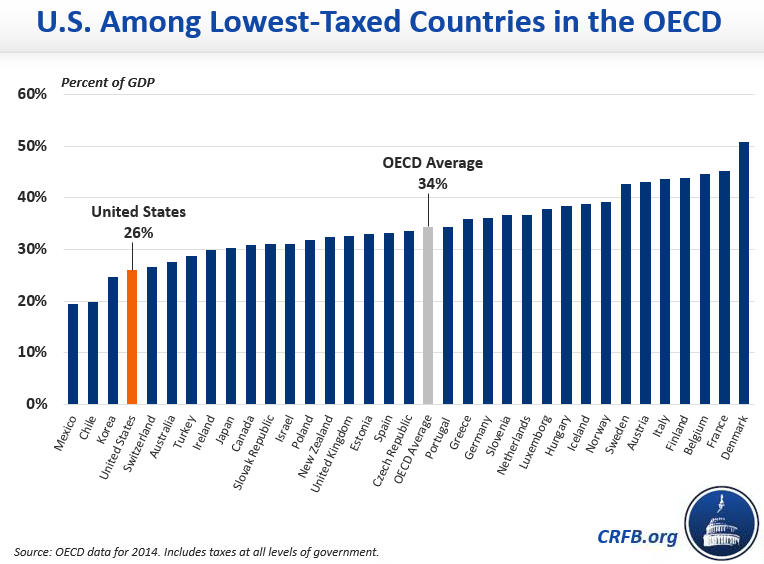At the individual level, it’s possible that Americans do not actually spend that much on healthcare relative to the rest of the world, even if America, collectively, spends the most on healthcare in terms of per-capita GDP.

I saw this picture going viral on Reddit. This counters the left-wing narrative of healthcare un-affordability. Yes, prices are high, but what matters more is how much people are actually paying, which at least in the example above, is not much.
One thing that is surprising ,even to me, is how little taxes Americans pay ,especially relative to the rest of the world, even after accounting for state taxes and FICA.

Despite supporting Trump, I have to admit that much of this fear by conservatives of the impending doom of high taxes is unfounded and comes across as crying wolf: in spite of record-high deficits and tons of spending, income taxes are the lowest they have ever been, and even with Biden in power there is no evidence to suggest income taxes will be going up anytime soon (a year ago I predicted that income taxes would not go up under Biden). Any attempt at raising income taxes even just a hair faces considerable congregational obstacles, and also as the late George Bush can attest, is very unpopular politically. There is no need to raise taxes when the treasury can borrow at close to 0% for 10 years to fund unlimited spending.
Also, the left is much more interested anyway in pushing for more Covid restrictions and mandatory vaccinations, student loan debt forgiveness, protecting Roe v. Wade (such as in regard to the recent Texas law), more stimulus, and pushing for CRT in schools, than raising taxes anyway.
This holds even for high incomes. I remember many years ago I was paying taxes and I simply took the net profit I made and naively multiplied it by the highest bracket (or about .33, because I had made a lot from online/digital marketing), and dutifully sent it in. To my dismay, I got the largest refund check I had ever seen. I was stumped and just assumed it was some sort of mistake. Only years later did it occur to me why this was: the top bracket is ONLY for any income above $400k or so, so my effective rate was somewhere in the 20-25% range. It only asymptotically approaches 33%.
For example, including state taxes and FICA, someone who earned $100k in 2020 paid only a 22% tax rate. By comparison, the tax rate in the UK for someone who earned £73k pounds is around 30%. Health insurance in the U.S. costs an average of $4,500/year for an individual, so even including health insurance and out-of-pocket costs, Americans still have more discretionary income. Moreover, half of Americans have employer-sponsored health insurance.
So although the U.K. has the NHS, which is a form single-payer healthcare, pundits and politicians ignore that such ‘free’ healthcare is actually paid for by higher income taxes. So it’s not free after all. Americans are getting a better deal.
As someone in the Reddit comments of the aforementioned discussion can attest: “My dad’s been working part time at UPS for years. Just for the insurance benefits. He had a full hip replacement, he paid $50 in co-pays.”
But how about quality of care? In some respects the U.S. comes out ahead, but it’s hard to say for sure definitively. Although the U.S. lags Japan and other developed countries in terms of number of annual hospital visits or number of doctors per capita, the U.S. comes out ahead in terms of cancer survival, and increased number of visits can be explained by demographics (older people tend to visit the hospital more often compared to younger people).

I think this is where the premium is; Americans pay more, in part, for malpractice coverage, and thus doctors pass this cost on to their patients. Second, Americans pay more for increased urgency of care for serious conditions.
According to the OECD library, of developed countries as of 2016, only 27% of Americans had to wait a month to see a specialist, versus 60% of Canadians:

I moderate a cancer sub on Reddit, and one things that stands out to me is how little delay there is between symptoms, diagnosis, and treatment. Someone can go from having symptoms, to seeing a specialist, being tested, diagnosed, and undergoing surgery and chemotherapy within 1-2 weeks of showing symptoms, whereas in the U.K. or Canada waiting times may be much longer.
Admittedly though, the American healthcare system does seem needlessly convoluted and opaque. I think it can and should be streamlined, but part of the complexity has to do with Americans wanting choice; they want to choose their own insurer, doctor, hospital, the latest treatments (even if they may not work well and only add a few months of life at great cost compared to cheaper palliative care), etc. A one-size-fits-all approach could be cheaper and more efficient, but Americans would not stand for the lack of choice. For serious conditions such as cancer, quality matters more than cost or efficiency.
Solve obesity and diabetes and the majority of health costs will go away for americans.